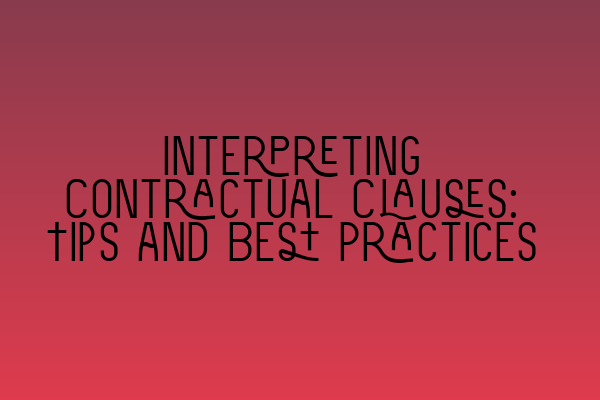Interpreting Contractual Clauses: Tips and Best Practices
When it comes to contract law, interpreting contractual clauses is a crucial task. These clauses define the rights and responsibilities of the parties involved and can determine the outcome of any legal disputes that may arise. Therefore, it is essential to ensure a clear and accurate interpretation of these clauses. In this blog post, we will explore some tips and best practices for effectively interpreting contractual clauses.
1. Understand the Language
The first step in interpreting contractual clauses is to thoroughly understand the language used in the contract. This may seem obvious, but it is essential to read the clause carefully and consider the specific words chosen. Each word has its ordinary meaning, and it is critical to interpret the clause based on those ordinary meanings unless there is a clear intention to deviate from them.
2. Consider the Context
While understanding the language is crucial, it is equally important to consider the context in which the contract was made. Context can include the nature of the contract, the relationship between the parties, any prior negotiations or agreements, and the commercial purpose of the contract. Taking these factors into account can provide valuable insights into the intentions of the parties and help in interpreting the clauses.
3. Look for Ambiguities
Contracts can sometimes contain ambiguous clauses, which can lead to misunderstandings and disputes. When faced with an ambiguous clause, it is crucial to analyze the different possible interpretations and consider the overall purpose of the contract. In such cases, courts often apply the principle of contra proferentem, which interprets any ambiguity against the party that drafted the contract.
4. Consider the Whole Agreement
A contract is a cohesive document, and it is essential to consider the contract as a whole when interpreting specific clauses. This means that each clause should be read and interpreted in light of the other provisions, ensuring that they work together to achieve the overall objectives of the contract. Interpreting a clause in isolation can lead to inconsistencies and contradict the intentions of the parties.
5. Consult Legal Authorities
When faced with complex or unfamiliar contractual clauses, it is beneficial to consult legal authorities, such as legal dictionaries, textbooks, or case law. These authorities can provide guidance on the interpretation of certain terms or clauses based on established legal principles and precedents. Legal authorities can also help in understanding any specific technical or industry terminology used in the contract.
6. Seek Legal Advice
In some cases, the interpretation of a contractual clause may be a matter of legal complexity or uncertainty. In such situations, it is advisable to seek legal advice from a qualified solicitor who specializes in contract law. A solicitor can provide valuable insights and help navigate through the complexities involved in interpreting contractual clauses.
Conclusion
Interpreting contractual clauses is a crucial task in contract law. By understanding the language, considering the context, looking for ambiguities, considering the whole agreement, consulting legal authorities, and seeking legal advice when necessary, you can ensure a clear and accurate interpretation of contractual clauses. Effective interpretation can prevent misunderstandings, disputes, and potential legal pitfalls.
For more information on legal topics and resources, check out the following related articles:
– Mentorship for Aspiring Solicitors: Nurturing Talent in the Legal Field
– Legal Challenges and Pitfalls: Navigating the Complexities of the Legal System
– Demystifying the Solicitors Qualifying Examination (SQE): What You Need to Know
– Recognizing Excellence: Law Industry Awards and Accolades
– Mentorship for Aspiring Solicitors: Finding Guidance on Your Legal Journey
Remember, interpreting contractual clauses requires attention to detail and a thorough understanding of the contract’s language, context, and intentions. By following these tips and best practices, you can ensure a comprehensive and accurate interpretation of contractual clauses in your legal work.
